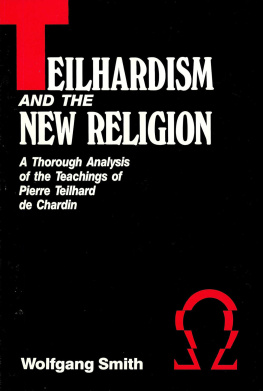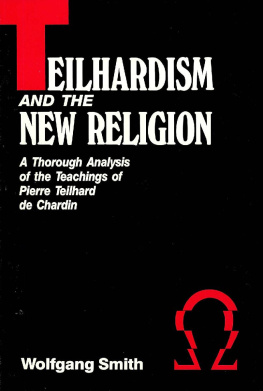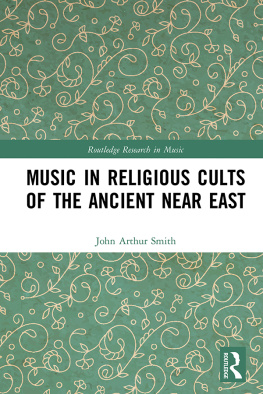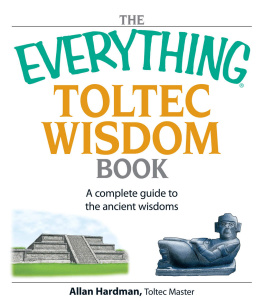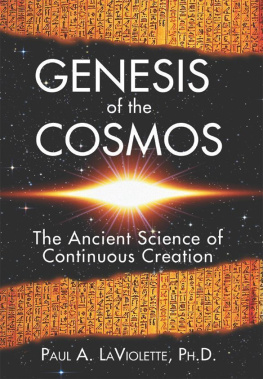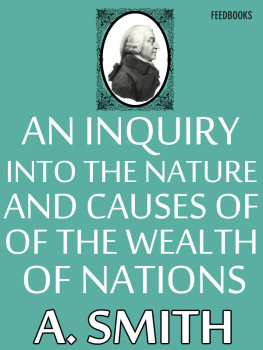ancient wisdom
and Modern misconceptions
A Critique of Contemporary Scientism
BY THE SAME AUTHOR
Cosmos and Transcendence:
Breaking Through the Barrier of Scientistic Belief
Science and Myth:
With a Response to Stephen Hawkings The Grand Design The Quantum Enigma: Finding the Hidden Key
Sagesse de la Cosmologie Ancienne
Christian Gnosis:
From Saint Paul to Meister Eckhart
Rponse Stephen Hawking:
De la Physique la Science-Fiction
Theistic Evolution:
The Teilhardian Heresy

Wolfgang Smith
ancient wisdom
and modern misconceptions
A Critique of Contemporary Scientism
First published in the USA
Wolfgang Smith 2013
Angelico Press /Sophia Perennis, 2013
Revised and expanded edition of the work originally
published as The Wisdom of Ancient Cosmology:
Contemporary Science in the Light of Tradition
Foundation for Traditional Studies, Oakton, VA, 2004
All rights reserved
Series editor, James R. Wetmore
No part of this book may be reproduced or transmitted,
in any form or by any means, without permission.
For information, address:
Angelico Press /Sophia Perennis,
4619 Slayden Rd. NE, Tacoma, WA 98422
angelicopress.com
sophiaperennis.com
978-1-62138-021-4 pb
978-1-62138-023-8 cloth
Cover Design: Michael Schrauzer
Cover image: Thomas Wright, A synopsis of the universe, or,
the visible world epitomizd (details), [London]: Printed for the Author and According to Act of Parliament, 1742.
table of contents
Preface 1
Foreword 3
Introduction 7
1
From Schrdingers Cat to Thomistic Ontology 14
Eddington and the Primacy of the Corporeal 29
The Ontology of Bells Theorem 55
Celestial Corporeality 68
The Extrapolated Universe 92
The Pitfall of Astrophysical Cosmology 118
The Status of Geocentrism 141
Esoterism and Cosmology:
From Ptolemy to Dante and Cusanus 159
Intelligent Design and Vertical Causality 180
Interpreting Anthropic Coincidence 205
Index of Names 233
In Memoriam
Rev. Fr. Malachi Martin
July 27, 1999
Preface
This is a revised edition of a book entitled The Wisdom of AncientCosmology published a decade ago, containing ten of the original twelve chapters. These take the form of essays covering a broad spectrum of topicsfrom the seeming paradoxes of quantum theory to the staggering claims of contemporary astrophysicseach of which hinges upon an application of Ancient Wisdom to the topic at hand: the rigorous application of traditional keys to put it in Professor Borellas words.
The customary order of priority is thus reversed: instead of view-ing the sapiential traditions from the perspective of contemporary sciencewhich amounts to explaining away the most profound
and most sacred beliefs of mankind!the new approach mobilizes the aforesaid Wisdom to attain a metaphysical grasp of the stipulated scientific findings. The result is twofold. First, this approach brings to light the crucial distinction between actual scientific discovery and what I have termed scientistic myth, which turns out to
include a major part of what the general public regards as scientific fact. And secondly, having separated the grain from the chaff one arrives at the realization that the actual findings of contemporary scienceits non-mythical component thusso far from contradicting the traditional doctrines, can indeed be integrated into that cosmologia perennis, which is to say: can in fact be understood.
Here, then, we have the answer to Feynmans No one under
stands quantum theory and Whiteheads lament that physics has turned into a kind of mystic chant over an unintelligible universe.
What renders the universe intelligible proves finally to be none other than that long-neglected and long-despised Ancient Wisdom which in the final count outweighs the contingent productions of mortal endeavor.
Wolfgang Smith
Camarillo, December 15, 2012
Ancient Wisdom and Modern Misconceptions
Foreword
That there are today, in our civilization, religions with followers still standing by their beliefs is, with respect to the modern world, a kind of anomaly: religious belief definitely belongs to a bygone age. A believers situation, whatever his religion, is not an easy one then.
But what is true for all sacred forms is especially true for Christianity, because for three centuries it has been directly confronted by the negations of modernity. The day when Hinduism, Buddhism or
Islam experience the omnipresence of this modernity, they will undoubtedly in their turn undergo serious crises.
The blows dealt by the modern world against a peoples religious soul is in the first place concerned with the plane of immediate and daily existence. No need for ideological struggle here; merely by the strength of its presence and extraordinary material success, this world refutes the world of religion, silences it, and destroys its power. This is because religion speaks of an invisible world, while contemporary civilization renders the sensory world more and
more present, the invisible more and more absent.
This is, however, only the most apparent aspect of things. The omnipresence of a world ever more worldly is only the effect, in the practical order, of a more decisive cause that is theoretical in nature, namely the revolution of Galilean science, its technical progress being only its consequent confirmation. For the religious soul, the importance of the scientific revolution consists in the fact that it affects this souls own inwardness. As powerful as it might be, for the human being, society represents only an environment which it can in principle ward off. Whereas the scientific revolution, insofar as it ascribes the truth to itself, imposes itself irresistibly and from within on the intelligence that it besieges. It is a cultural and therefore a spiritual revolution to the extent that it makes an appeal to our mind. But whenever it is a question of a believers mind, it is the vision of the world and the reality implied by his faith that is 3
Ancient Wisdom and Modern Misconceptions
subverted. What remains then is the option either to renounce his faith, or elsean almost desperate solutionto renounce entirely the cosmology that it entails.
On the whole Christian thought has committed itself to this second way: to keep the faith (but a purified faith!) and abandon all the cosmological representations by which that faith has been
expressed. This is a desperate solution because these cosmological representations are first scriptural presentations, the very forms by which God speaks to us about Himself. But if we disregard these forms, what remains of our faith? Scripture informs us that the apostles saw Christ raised from the earth and disappear behind a cloud, while Galilean science objects that space is infinite, that it has neither high nor low, and that this ascension, even supposing it to be possiblewhich it is notis meaningless. What remains is then to see in it a symbolic fiction by which the early Christian community attempted to speak its faith in a vanished Jesus Christ: if He is no longer visible, this is because He has gone back to heaven. Following Rudolf Bultmann the majority of Protestant and Catholic exegetes and theologians have adopted this solution. Since then an immense process of
Next page

